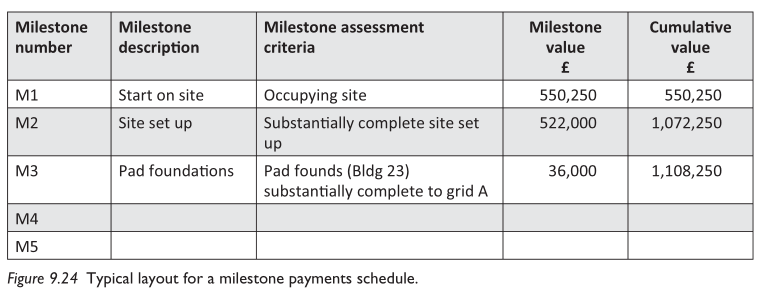Cash flow in construction
Contents |
[edit] Introduction
In general terms, 'cash flow' is the movement of income into and expenditure out of a business (or other entity) over time. If more money is coming into the business than is going out of it, cash flow is said to be 'positive'. If more money is going out, this is negative cash flow.
In construction, however, the term 'cash flow' typically refers to an analysis of when costs will be incurred and how much they will amount to during the life of a project.
Predicting cash flow is important in order to ensure that an appropriate level of funding is in place and that suitable draw-down facilities are available.
[edit] Client cash flow
Until the main contractor has been appointed, client cash flow projections are likely to be based only on agreed fee payment schedules for consultants and a simple division of the construction cost over the likely construction period (or perhaps an allocation of construction cost over an s-curve distribution). It is only when the main contractor is appointed, a master programme prepared and some form of payment schedule agreed that cash flow projections become reliable.
Cash flow projections may be affected by the need for the early purchase of long-lead time items or by items that the client may wish to purchase that are outside of the main contract (such as furniture or equipment).
[edit] Contractor cash flow
Contractors have to have money coming in to pay suppliers and subcontractors and for the day-to-day running of the business. For example, Carillion's cash flow was very low, leading to their liquidation in January 2018.
At the start of any contract, a payment scheme or table is drawn up and agreed with the client or their quantity surveyor, e.g.:
[Brook, M., 2016. Estimating and Tendering for Construction Work. 5th Edition. ed. Taylor & Francis.]
[edit] Supply chain cash flow
Cash flow is also an issue for the construction supply chain, and is a common reason for contractors and sub-contractors becoming insolvent. This can be catastrophic for a project in terms of time and money. It is in the client's interest therefore to ensure that the supply chain is paid promptly.
The government suggest that, 'Historically, it is has not been unusual for lower tier supply chain members to have to wait for up to 100 days to receive payment, which damages their cash flow and can harm their business.' (Ref. Cabinet Office, Project Bank Accounts – Briefing document.)
A number of measures can be adopted to improve payment and so cash flow in the supply chain, including:
In addition, there are a number of remedies for late payment.
[edit] Related articles on Designing Buildings
- Accruals.
- Balance sheet.
- Budget.
- Building society.
- Business administration.
- Cash flow forecast.
- Cash flow statement.
- Commodity.
- Construction supply chain payment charter.
- Credit crunch.
- Demand chain.
- Discounting.
- Discount rate.
- Discounted cash flow.
- Drawdown.
- Earned value.
- Fair payment practices.
- Financial hedging.
- Financial year.
- Microeconomics.
- Net Present Value.
- Payment schedule.
- Profit.
- Project bank accounts.
- Prompt payment.
- Prompt Payment Code boosted to help SMEs.
- Quote.
- Relevant cost.
- Remedies for late payment.
- Retention.
- Solvency.
- Time value of money.
- The Late Payment of Commercial Debts Regulations 2013.
- Trade credit insurance.
- Turnover.
- Whole life costs.
- Working capital.
Featured articles and news
Infrastructure that connect the physical and digital domains.
Harnessing robotics and AI in challenging environments
The key to nuclear decommissioning and fusion engineering.
BSRIA announces Lisa Ashworth as new CEO
Tasked with furthering BSRIA’s impressive growth ambitions.
Public buildings get half a million energy efficiency boost
£557 million to switch to cleaner heating and save on energy.
CIOB launches pre-election manifesto
Outlining potential future policies for the next government.
Grenfell Tower Inquiry announcement
Phase 2 hearings come to a close and the final report due in September.
Progress from Parts L, F and O: A whitepaper, one year on.
A replicated study to understand the opinion of practitioners.
ECA announces new president 2024
Electrical engineer and business leader Stuart Smith.
A distinct type of countryside that should be celebrated.
Should Part O be extended to existing buildings?
EAC brands heatwave adaptation a missed opportunity.
Definition of Statutory in workplace and facilities management
Established by IWFM, BESA, CIBSE and BSRIA.
Tackling the transition from traditional heating systems
59% lack the necessary information and confidence to switch.
The general election and the construction industry
As PM, Rishi Sunak announces July 4 date for an election.
Eco apprenticeships continue help grow green workforce
A year after being recognised at the King's coronation.
Permitted development rights for agricultural buildings
The changes coming into effect as of May 21, 2024.






















Comments
Cash flow is the movement of income into and expenditure out of a business over time. If there is more money going out than in, this is negative cash flow.
Possible cash flow problems may be:
To minimise the risks of future cash flow problems, the firm could establish a financial system that includes: